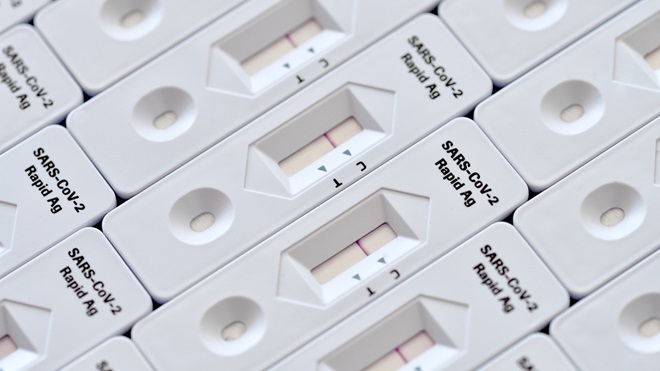Need to know
- Rapid antigen tests are being sold at inflated prices by some retailers
- The ACCC is investigating the price gouging
- Advocates say stronger price-gouging protections are needed for consumers
It was only a few weeks ago that COVID-19 rapid antigen tests (RATs) were readily available at most chemists and supermarkets for around $10 for a single unit.
But in the face of surging infection numbers around Australia and government moves to encourage at-home testing to reduce the pressure on the PCR testing system, RATs have become a scarce commodity.
RATs are sold out in many chemists and supermarkets around the country and people online are sharing their frustrations at trying to acquire the tests.
One Sydney restaurant was spotted selling a single test for $50 on UberEats
Meanwhile, some retailers are taking advantage of the scarcity to hike the prices of what stock they do have.
Many people shared stories with CHOICE of chemists charging between $20 and $25 for a single RAT. Journalist Airlie Walsh took to Twitter to express her dismay at the RATs being sold for $30 each at a BP petrol station in the Sydney suburb of Edgecliff.
Online retailer Dick Smith and its parent company Kogan took it further, selling a single test online for $45, and one Sydney restaurant was spotted selling a single test for $50 on the food delivery app UberEats.
Update 5/1/2022: Kogan contacted us upon publication of this article to say that the vendors selling goods on its website set their own prices, and acknowledge that at least one rapid antigen test seller was recently overcharging.
"We were made aware of a vendor charging high prices for rapid tests, and due to the poor customer experience this provides we immediately removed the item from sale," a Kogan spokesperson tells CHOICE.
Supply and demand
Monash University Professor of Law Resources Mark Davidson says there's little by way of consumer protections to stop retailers setting high prices for the tests.
"You've got a product which is in high demand and the price will go up, that's a fact," he tells CHOICE.
Davidson cautions against the idea of price controls, saying it wouldn't be a simple decision.
"Who is going to make the decision and on what basis? Who is going to set the price at what levels and why?"
'Pure greed'
But Dean Price, senior campaigns and policy adviser at CHOICE, says there's no justification for companies selling RATs at 350% above their usual price, calling it "pure greed".
"Massively increasing the cost of rapid antigen tests is inexcusable. With record cases of COVID-19, companies must end this greedy behaviour that is stopping people from accessing vital rapid tests. Companies shouldn't be ripping people off for this essential testing equipment," he says.
Have you seen examples of extreme price gouging on rapid antigen tests or other essential medical items?
Contact CHOICE investigative journalist Jarni Blakkarly at [email protected].
ACCC investigating
On Tuesday, the Australian Competition and Consumer Commission put out a statement saying it's investigating the high prices of rapid antigen tests and had established a team to work on the issues.
"The ACCC is aware of the significant public concern about the pricing of rapid antigen tests and is contacting suppliers and monitoring the situation very closely. The ACCC will be examining claims that the current pricing levels of rapid antigen tests are due to challenges in obtaining supply of those tests," the statement says.
"We are seeking information from suppliers about their costs and the current pricing of rapid antigen tests," says ACCC chair Rod Sims. "We are also asking them about their current stock levels, and the amounts on order, and about their expectations about when additional tests may become readily available to consumers."
While suppliers can set their own prices, businesses must not make false or misleading statements about the reason for high prices
"We are also contacting major retailers and pharmacies seeking similar information and reminding them that they need to be able to substantiate any claims they make to consumers about the reason for higher prices."
The statement went on to say that while suppliers can set their own prices, businesses must not make false or misleading statements about the reason for high prices.
"We won't be shy to name and shame suppliers and retailers we consider to be doing the wrong thing," Sims says.
In certain circumstances, Sims adds, excessive pricing of essential goods or services may also be unconscionable.
When contacted by CHOICE, the ACCC declined to say what would classify as "excessive" when it came to the price of RATs.
Stronger protections needed
CHOICE's Dean Price says that along with an ACCC investigation, state and territory governments also need to put in place consistent laws to stop price gouging on essential items during the pandemic.
"People need protection from rogue businesses that are price gouging," he says. "Unfortunately, we've seen this sort of price gouging throughout the pandemic."
We're on your side
For more than 60 years, we've been making a difference for Australian consumers. In that time, we've never taken ads or sponsorship.
Instead we're funded by members who value expert reviews and independent product testing.
With no self-interest behind our advice, you don't just buy smarter, you get the answers that you need.
You know without hesitation what's safe for you and your family.
And you'll never be alone when something goes wrong or a business treats you unfairly.
Learn more about CHOICE membership today
Stock images: Getty, unless otherwise stated.



